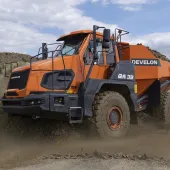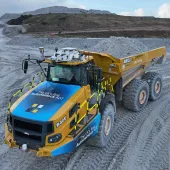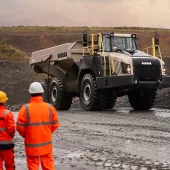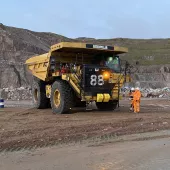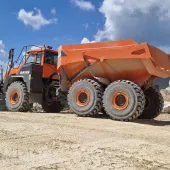Extreme weather protection advice from Terex Trucks
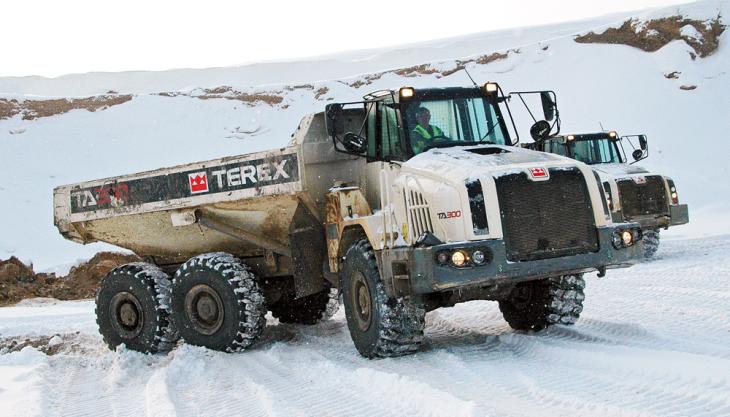
Customer support manager John Hunter offers some top tips keep haulers moving during the winter chill
WITH temperatures dropping, winter is the time of the year when the relationship between man and machine is put to the ultimate test. From frostbite to fatigue failures, operating in extremely low temperatures where downtime is not an option can be a significant challenge.
However, help is at hand from John Hunter, Terex Trucks’ regional customer support manager and a veteran of Siberian winter temperatures as low as –30°C. With a career at Terex Trucks that dates back more than 40 years, in this article he provides some key advice to aid safe operation and prevent damage to off-highway haulers in the extreme cold.
First, to avoid machine downtime or expensive repairs in the future, operators must not neglect air filtration, fuel, and lubrication, as Mr Hunter explained: ‘It’s important to drain sediment in the fuel daily, as it’s one of the greatest causes of fuel-injection system failures. In addition to cleaning the fuel tank and making sure it’s functioning correctly, the tank must be full to reduce moisture condensation. It’s also good practice to keep a spare filter handy.’
As diesel fuel is prone to gelling or waxing in cold weather, Mr Hunter also recommends only using Arctic oils that meet API specifications, fuel with the maximum cloud and points of 6°C or 10°F, and winter protection kits that eliminate idling.
To meet the needs of trucks working in extremely low temperatures, Terex Trucks have released two extreme cold weather protection kits for their rigid haulers. The first of the two Webasto-supplied kits, labelled Winter Kit, defends trucks working for prolonged periods in temperatures down to –25°C, while a second, Arctic Kit, ensures safe operating down to temperatures as low as –40°C.
Thanks to the truck-mounted Thermo-Heater, non-productive fuel consumption, engine wear and tear, and prolonged downtime are significantly reduced. This new technology makes use of an environment-friendly start-stop system and uses only a very small amount of diesel.
The Thermo-Heater is powered once the engine is shut down, whereupon it draws the coolant from the engine and circulates it around critical components. The engine-independent heater has the ability to keep the machine’s vital organs at a pre-determined temperature for hours after the motor is switched off, ensuring a trouble-free restart even after prolonged exposure.
Mr Hunter also recommends that cooling systems should be inspected weekly, particularly the coolant reservoir and hoses. Throughout the winter, a close eye should be kept on the coolant as it does much more than simply stop the cooling system from freezing – it also increases the boiling point temperature, confines cavitation, averts corrosion and lubricates shaft seals.
He added: ‘Make sure that the cooling system is adequately protected from the climatic conditions and that coolant in the radiator is filled to the cap. Also, in extreme climates, the ratio of ethylene glycol antifreeze to water should be 60:40, to eliminate the possibility of the water freezing and creating stress in the engine.’
It is essential to make sure batteries are properly charged throughout winter if machines are to be put to work, as attempting to charge a frozen battery can cause the battery to explode. This is why maintenance of the battery should begin in the autumn, and operators must ensure the electrolyte is topped up to the indicated level and flowing over the plates. Another key step to facilitate consistent current supply from the battery to the machine is by cleaning any debris and rust from the top of the battery.’
If planning to store trucks over the winter season, Mr Hunter says batteries should be protected from temperature extremes and terminals and cable ends should be coated with acid-resistant petroleum jelly.
Throughout winter, the inflation pressure of tyres should be checked at least once every two weeks. To minimize wear, any debris, grease or oil should be removed from the tyres and they should be regularly inspected for any cracking and chunking. Mr Hunter added: ‘If extended storage is anticipated, a truck should be blocked up so that its weight does not rest entirely on the tyres. Ideally, it’s better if machines are stored under cover, otherwise tyres need to be protected from the elements by an opaque waterproof covering.’
Finally, as well as protecting the machine from the elements, operators must also be adequately prepared to work in extreme conditions. ‘Wear as many layers of clothing as possible but allow for comfortable movement. One thick layer of clothing is not as effective in insulating the body against the cold in the way several layers can,’ said Mr Hunter.
‘It’s important to protect your head, ears, nose, hands, and feet. More than 40% of body heat can be lost from the head if it’s left uncovered, which is why wearing warm a hat with ear covers is crucial when working in the cold. Likewise, it’s important to be aware of the medical conditions that can arise from cold weather exposure, such as cold stress, frostbite and hypothermia.’
According to Mr Hunter, the first layer of clothing needs to be synthetic as opposed to cotton, as synthetic materials wick sweat away from the body while cotton absorbs it. The second layer should preferably be wool, whilst the third should be weather-proof with good down insulation, and footwear must be waterproof and insulated.
Operators can also keep out the cold with frequent warm drinks, such as decaffeinated coffee, tea or hot chocolate. Caffeine should be avoided when working in the cold, as it hinders the body’s heat-producing mechanisms and causes the body’s core temperature to drop.
In his latest role, Mr Hunter is responsible for providing support to customers in North America, having previously dealt with clients in Russia. Over the past two years, Terex Trucks have invested heavily in boosting the availability of parts stocks, systems and specialists for customers in North America, and they say relocating such an authority as Mr Hunter is an example of the strengthened support customers can expect.


